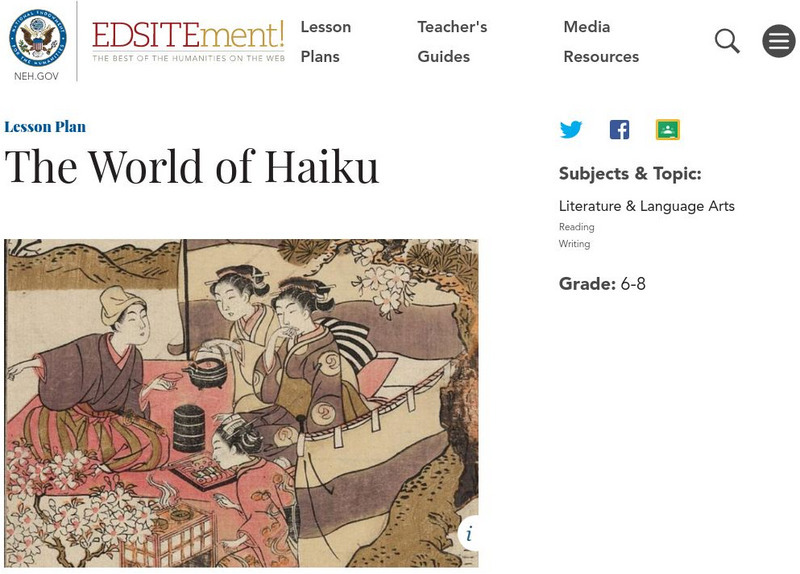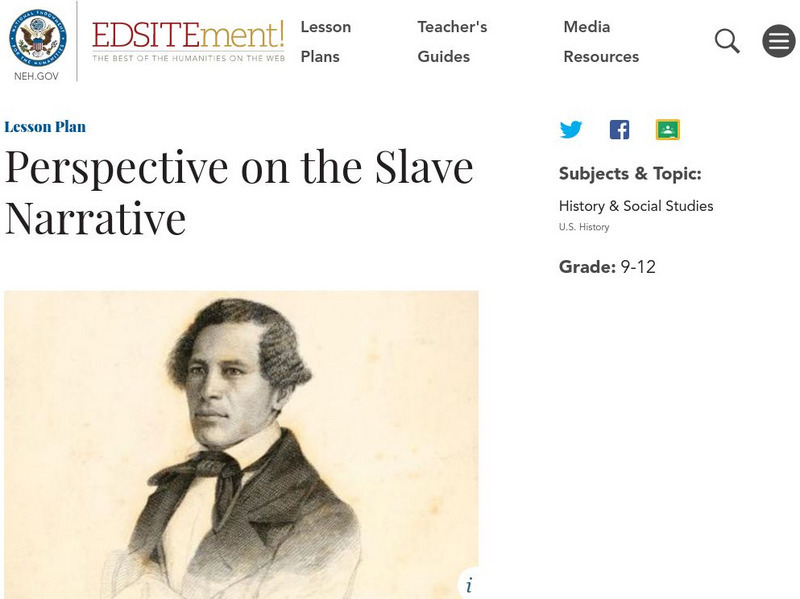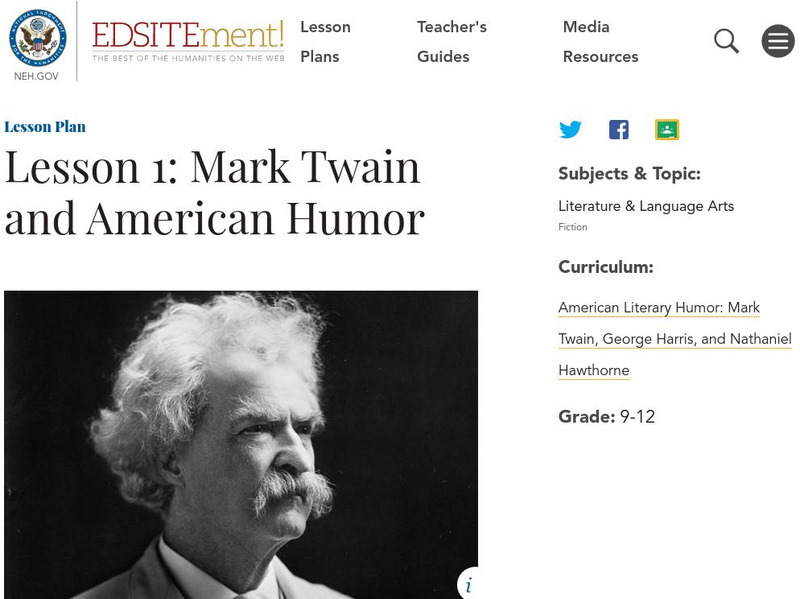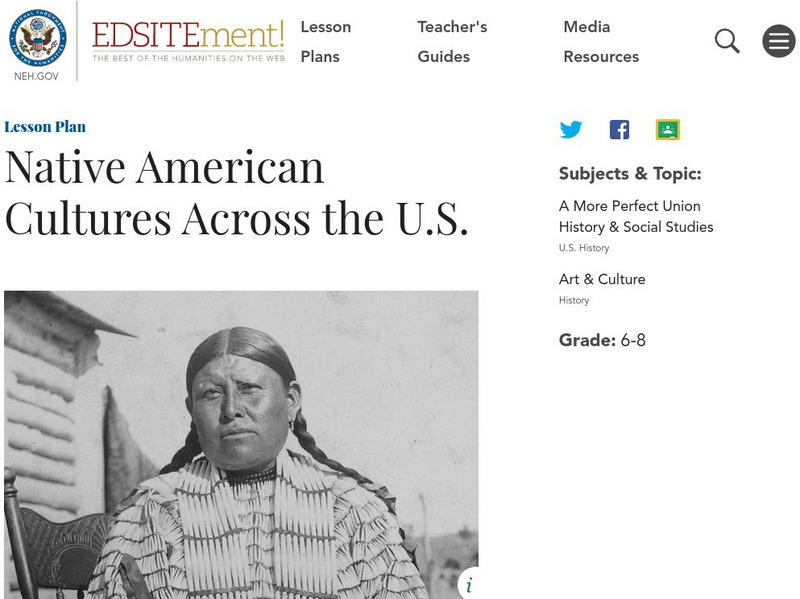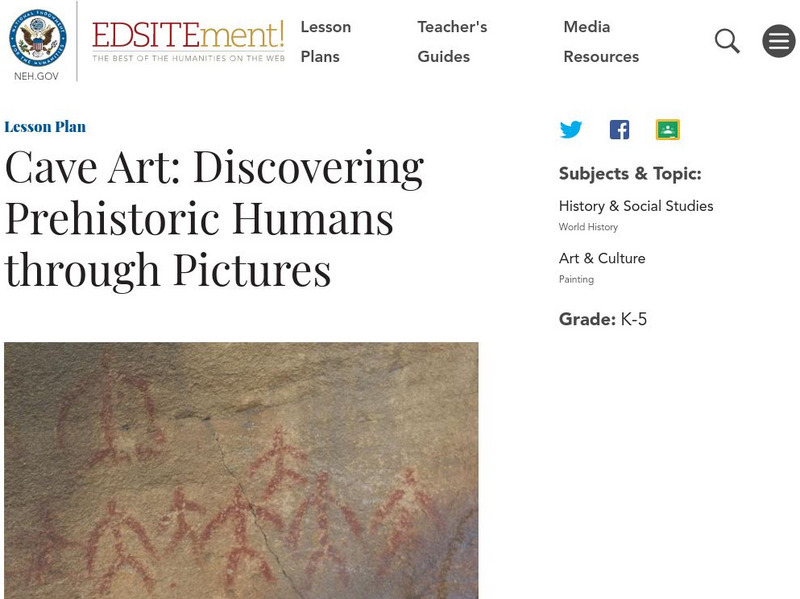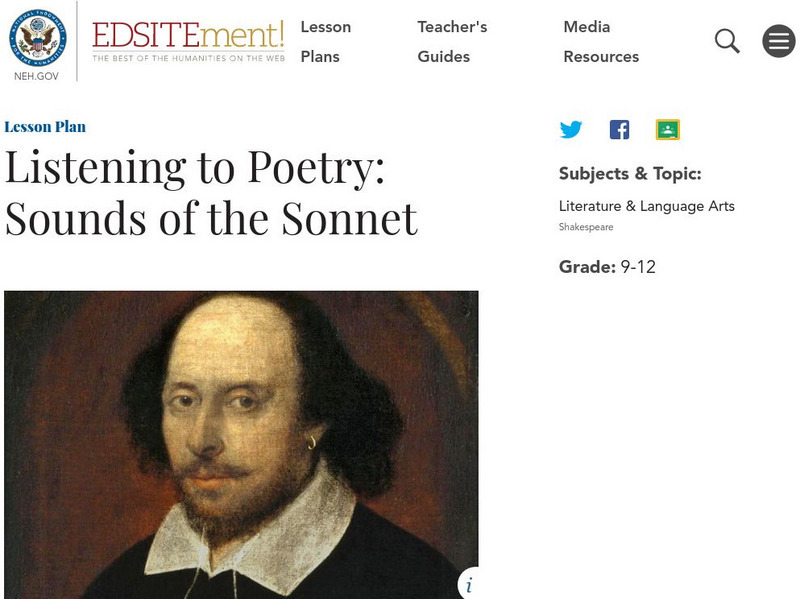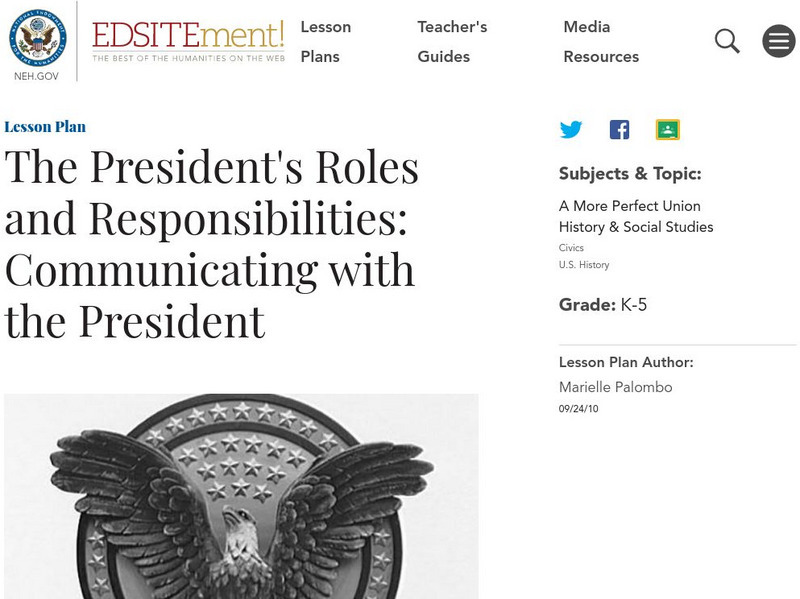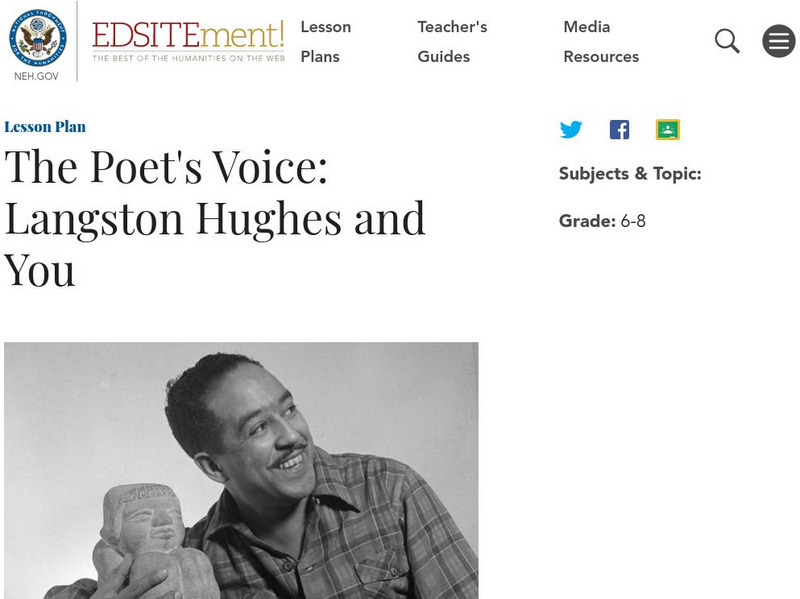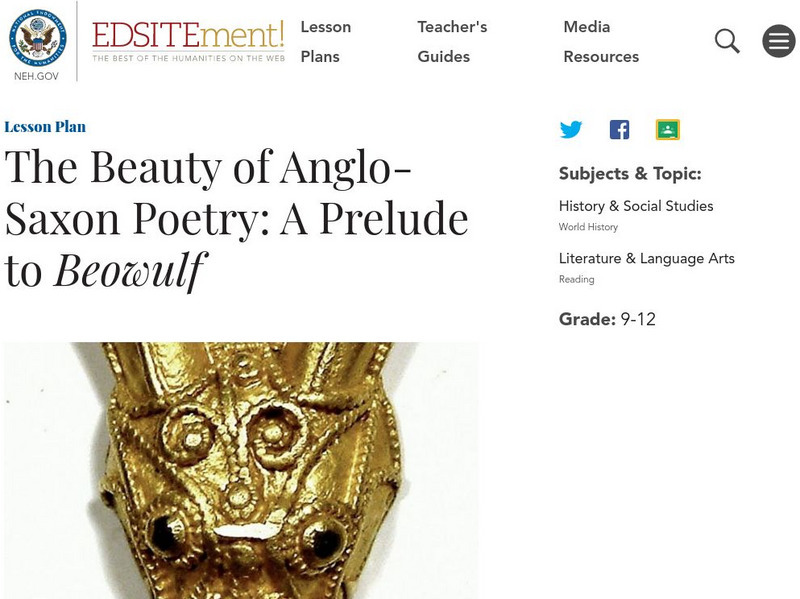National Endowment for the Humanities
Neh: Edsit Ement: I've Just Seen a Face Portraits Lesson Plan
This website contains a lesson plan in which learners attempt to analyze different types of portraits for better understanding. It contains 6 different lessons in which students look at examples of portraits of children, important...
National Endowment for the Humanities
Neh: Edsit Ement: Common Visions, Common Voices
This lesson plan gives students a chance to explore the art and literature of Indians, Africans, Mayans, and Native Americans. Provides plenty of links to photo examples, and activity extension ideas.
National Endowment for the Humanities
Neh: Edsit Ement: Born on a Mountaintop: Davy Crockett, Tall Tales & History
These four lesson plans integrate the life of Davy Crockett and the tall tales that were created about him. Includes a printable rubric, lesson extensions, links, and much more!
National Endowment for the Humanities
Neh: Edsit Ement: The World of Haiku
A productive, technologically relevant site that provides a lesson plan on the Japanese Haiku. Complete with educational objectives and extensive student-centered lesson development.
National Endowment for the Humanities
Neh: Edsit Ement: Storytelling:the Meaning Behind the Mask
In many cultures, masks are used in oral story telling. Many learning activities are described on this site that will help students learn aspects of story telling and the different ways various cultures used masks.
National Endowment for the Humanities
Neh: Edsit Ement: Perspective on the Slave Narrative
A lesson plan focusing on the the historical context of slave narratives, "Perspective on the Slave Narrative" introduces students to the abolitionist movement and the slave experience.
National Endowment for the Humanities
Neh: Edsit Ement: Mark Twain and American Humor
This lesson leads high school students through a greater understanding of the conventions of the literary device of "Humor," through a study of Mark Twain and the story "The Celebrated Jumping Frog of Calaveras County." A three-part...
National Endowment for the Humanities
Neh: Edsit Ement: Flag Facts
The young scholars will learn important historical significance to one of the United States' most important symbols - the American Flag. This lesson plan provides engaging and meaningful activities as well as the academic content...
National Endowment for the Humanities
Neh: Edsit Ement: Native American Cultures Across the United States
Learners explore different aspects of the cultures of the First Americans in this lesson plan. Stereotypes are often associated with Native Americans through movies and in the context of the Thanksgiving holiday. Specific information and...
National Endowment for the Humanities
Neh: Edsit Ement: Bringing the "New Colossus" to America
This lesson plan provides suggestions for augmenting a study of The Statue of Liberty. Includes information on the Emma Lazarus sonnet, "The New Colossus," (which was written about the statue) and the attitudes towards immigration during...
National Endowment for the Humanities
Neh: Edsit Ement: Civil Rights Movement
This lesson on the Civil Rights movement is organized into three sections: "Identifying the Need for Change," "Ordinary People in the Civil Rights Movement," and "Historic Places in the Civil Rights Movement."
National Endowment for the Humanities
Neh: Edsit Ement: Cave Art Discovering Prehistoric Humans
By studying cave paintings, students learn about prehistoric cultures and the stories and ideas they wished to communicate to others through art. The lesson plan presented on this website aims to show young students the significance of...
National Endowment for the Humanities
Neh: Edsit Ement: Cave Art
This site contains very detailed lesson plans for teaching about cave art, specifically the Lascaux Cave. Within the site there are links to the Lascaux Cave website where students can explore the caves. The site also contains detailed...
National Endowment for the Humanities
Neh: Edsit Ement: Sounds of the Sonnet
"Sound Experiments" drive this lesson plan. Sonnet analysis is accompanied by readings based on specific emotions. At this website, there are several links full-text sonnets by such authors as Shakespeare, Lord Byron, Longfellow, and...
National Endowment for the Humanities
Neh: Edsit Ement: Sounds of the Sonnet
This resource presents a activity in which students learn to study the form, sounds, and meanings of sonnets (particularly those by Shakespeare) in an interesting and interactive way.
National Endowment for the Humanities
Neh: Edsit Ement: Anishinabe Ojibwe Chippewa: Culture
Though written for grades 3-5, this lesson plan can be easily changed to help students of all ages learn about the Chippewa people. Additional resources provide historical, cultural, and geographical facts concerning this Native American...
National Endowment for the Humanities
Neh: Edsit Ement: Traditions and Languages of Three Native Cultures
This lesson plan helps students learn aspects of three Native American languages, the Tlingit, Lakota, and Cherokee. Five lessons lead teachers and students through traditions, similarities and differences, and the importance of...
National Endowment for the Humanities
Neh: Edsit Ement: Communicating With the President
Students will be able to apply knowledge about the writing process in this lesson plan about communicating with the President of the United States. Presidential Resources, academic content standards and ways to extend the lesson are...
National Endowment for the Humanities
Neh: Edsit Ement: Understanding the President's Job
What does the President do? Understanding how our democracy works includes understanding how the Executive branch of our government works. Teachers can use this lesson plan to explore with students the job of the President. Academic...
National Endowment for the Humanities
Neh: Edsit Ement: Lesson Plan: Arabic Poetry
This online lesson plan introduces information about the Arabic poetic art form known as the ghazal. It includes Educational Objectives, classroom activities and projects, examples, and a list of the relevant national educational standards.
National Endowment for the Humanities
Neh: Edsit Ement: Japanese Poetry Tanka? You're Welcome
A poem "which expresses a personal response to nature," the tanka is a form of Japanese writing very similar to the haiku. This lesson plan is a great extension to any study or exploration of Japanese art, culture, and writing. Included...
National Endowment for the Humanities
Neh: Edsit Ement: Shakespeare's Othello and the Power of Language
A lesson plan focusing on the power of Iago's language, as shown through his crafty deception of Othello, "Shakespeare's Othello and the Power of Language" provides several links to information on Shakespeare, Othello, and rhetoric.
National Endowment for the Humanities
Neh: Edsit Ement: The Poet's Voice: Langston Hughes and You
What is meant by voice in poetry, and what qualities have made the voice of Langston Hughes a favorite for so many people? This lesson will lead students to learn about the qualities that make Langston Hughes's voice distinctive,...
National Endowment for the Humanities
Neh: Edsit Ement: A Prelude to Beowulf
Before reading the Anglo-Saxon epic poem, "Beowulf," learners should explore the Dark Ages through researching the fundamental characteristics of the art and literature produced during this period. This website provides links for doing...





